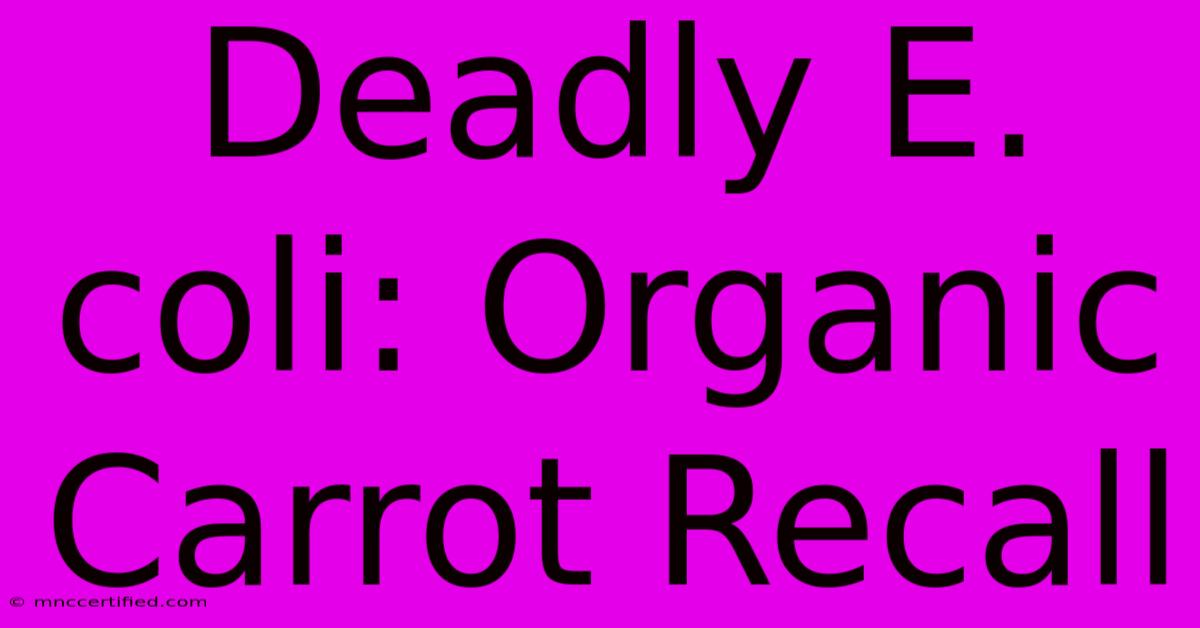Deadly E. Coli: Organic Carrot Recall

Table of Contents
Deadly E. coli Outbreak Linked to Organic Carrots: A Comprehensive Recall Update
A dangerous E. coli outbreak, linked to contaminated organic carrots, has prompted a widespread recall, leaving consumers concerned about food safety. This article provides a comprehensive overview of the situation, including the affected products, safety precautions, and the latest updates on the recall.
Understanding the E. coli Threat
Escherichia coli ( E. coli) is a type of bacteria commonly found in the intestines of humans and animals. While most strains are harmless, some, like the Shiga toxin-producing E. coli (STEC), can cause severe illness. STEC infections can lead to symptoms ranging from mild diarrhea to life-threatening complications like hemolytic uremic syndrome (HUS), particularly dangerous for young children and the elderly.
Key Symptoms of E. coli Infection:
- Diarrhea (often bloody)
- Stomach cramps
- Vomiting
- Fever
- Severe dehydration (in severe cases)
The Organic Carrot Recall: What You Need to Know
The recent recall involves several brands of organic carrots, potentially contaminated with STEC E. coli. The source of the contamination is still under investigation; however, preliminary findings suggest a problem at one or more points in the supply chain. It is crucial to check your refrigerator for recalled products immediately.
Identifying Recalled Products
The specific brands and product codes involved in the recall will vary. Check the official announcements from the FDA (Food and Drug Administration) and the CDC (Centers for Disease Control and Prevention) for the most up-to-date list of affected products. This information is typically available on their websites and social media channels. Pay close attention to:
- Brand name: Note the specific brand of organic carrots.
- Packaging: Check for lot numbers, best-by dates, and any other identifying information.
- Retailer: Knowing where you purchased the carrots can help with tracing the source and receiving potential updates.
What to Do If You Have Recalled Carrots
Do not consume any carrots that match the description of the recalled products. Even if the carrots appear fresh, they may still be contaminated. The safest course of action is to:
- Discard the recalled carrots immediately. Dispose of them in a sealed bag to prevent contamination of your trash.
- Thoroughly wash any surfaces that may have come into contact with the recalled carrots.
- Monitor for symptoms: If you or someone in your household experiences symptoms of E. coli infection, seek medical attention immediately. Early diagnosis and treatment are crucial.
Preventing Future E. coli Outbreaks
While this recall focuses on organic carrots, E. coli contamination can affect various produce items. To minimize your risk of foodborne illness, follow these guidelines:
- Wash your produce thoroughly: Rinse all fruits and vegetables under running water, even those labeled pre-washed.
- Cook food to the proper temperature: Ensure meats, poultry, and other susceptible foods are cooked to their recommended internal temperature.
- Practice good hygiene: Wash your hands thoroughly before and after handling food.
- Store food properly: Refrigerate perishable items promptly to prevent bacterial growth.
Staying Informed: Resources and Updates
Stay informed about this developing situation by regularly checking the following resources:
- FDA website: Look for official recall announcements and updates.
- CDC website: Find information about E. coli infections and prevention.
- Your local news: Local news outlets often provide updates on food safety recalls in your area.
This situation highlights the importance of food safety awareness and the need to carefully check for recalls before consuming any produce. By following these precautions, you can significantly reduce your risk of E. coli infection and protect your family's health. Remember, when in doubt, throw it out!

Thank you for visiting our website wich cover about Deadly E. Coli: Organic Carrot Recall. We hope the information provided has been useful to you. Feel free to contact us if you have any questions or need further assistance. See you next time and dont miss to bookmark.
Featured Posts
-
Freezing Temps Snow Hitting Midlands
Nov 19, 2024
-
Acceptance Insurance Wooster Ohio
Nov 19, 2024
-
Clean Sweep Australia Defeats Pakistan
Nov 19, 2024
-
Met Office Alert Snow Ice In Northwest England
Nov 19, 2024
-
Hojbjerg On Denmark Spain Needed Adjustments
Nov 19, 2024